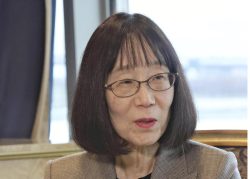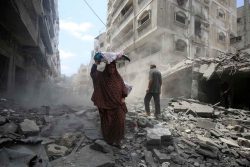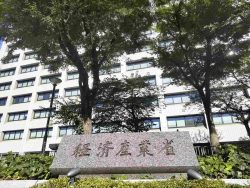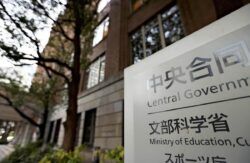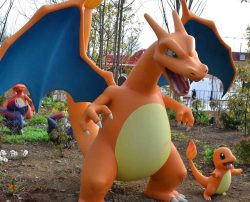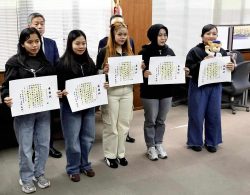U.S. Election Results May Have Influenced Russia, DPRK Pact; Moscow, Pyongyang Moving Toward Mutual Defense Treaty
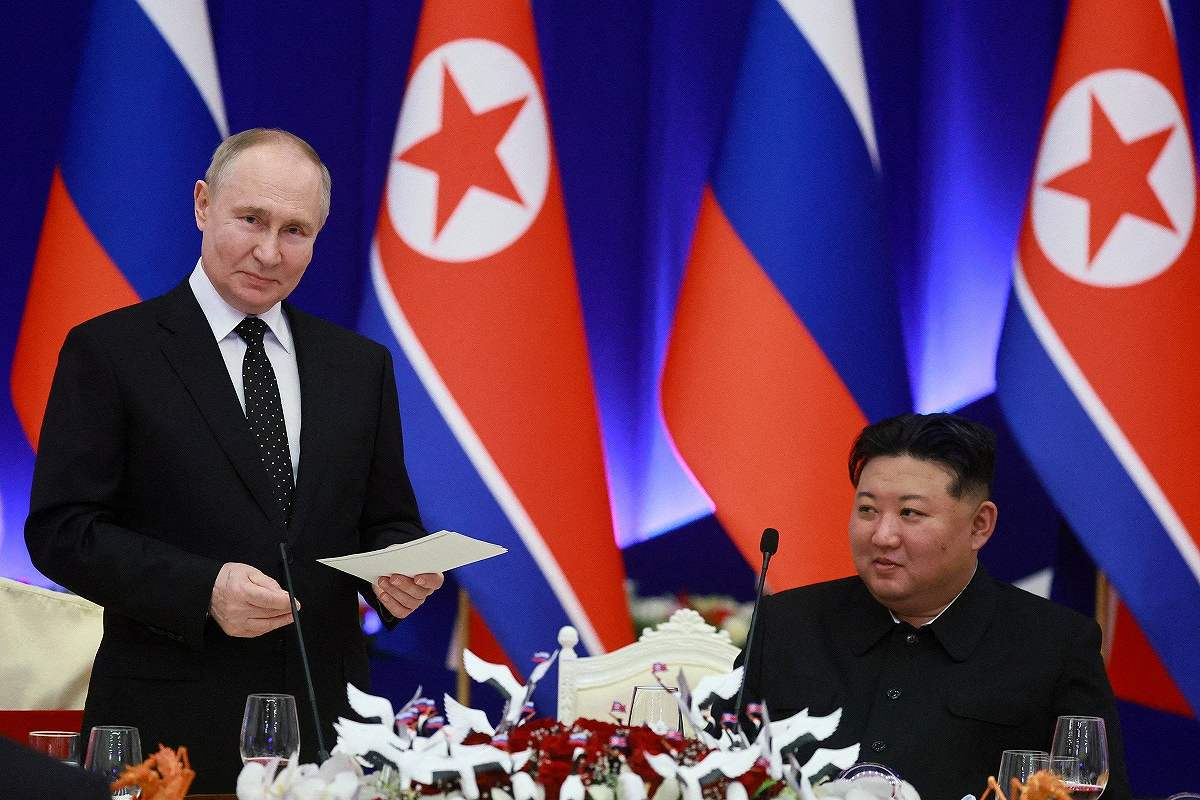
Russia’s President Vladimir Putin and North Korea’s leader Kim Jong Un attend a state reception in Pyongyang on June 19.
2:00 JST, November 14, 2024
SEOUL — Russia and North Korea are moving forward to finalize their mutual defense treaty while likely keeping close eyes on Donald Trump’s victory in the U.S. presidential election.
Moscow and Pyongyang have each completed the domestic procedures for their Treaty on Comprehensive Strategic Partnership, which stipulates mutual military support in the event of an emergency. When it comes into effect after the exchange of ratification documents, it will effectively mark the revival of their military alliance for the first time in 28 years.
Russia is likely utilizing North Korean soldiers to prepare for ceasefire negotiations following the inauguration of Trump, who has called for the early resolution of the Russia-Ukraine war. North Korea, for its part, is trying to keep the United States in check.
Collective self-defense
The Treaty on Comprehensive Strategic Partnership between North Korea and Russia was ratified, an electronic edition of The Rodong Sinmun — the official paper of North Korea’s ruling Workers’ Party of Korea (WPK) — reported Tuesday as a top story.
The paper reported that the “head of state” — a reference to WPK General Secretary Kim Jong Un — signed the decree Monday. According to observers, the two countries may set up a high-level meeting involving Kim and Russian President Vladimir Putin at the time the ratification documents are exchanged, to present their cooperation domestically and internationally.
The treaty was concluded in June when Putin met Kim in Pyongyang. Article 4 stipulates that if either of the two countries enters a state of war due to an armed invasion, the other “shall provide military and other assistance with all means in its possession.” The clause could be the basis for the exercise of the right of collective self-defense between Russia and North Korea.
A similar clause was stipulated in 1961 between the Soviet Union and North Korea under the Treaty of Friendship, Cooperation and Mutual Assistance about an obligation to intervene in the event of an armed attack on either party that leads to a war. That treaty expired in 1996 after the collapse of the Soviet Union, and was replaced by a 2000 pact that did not contain a military intervention clause.
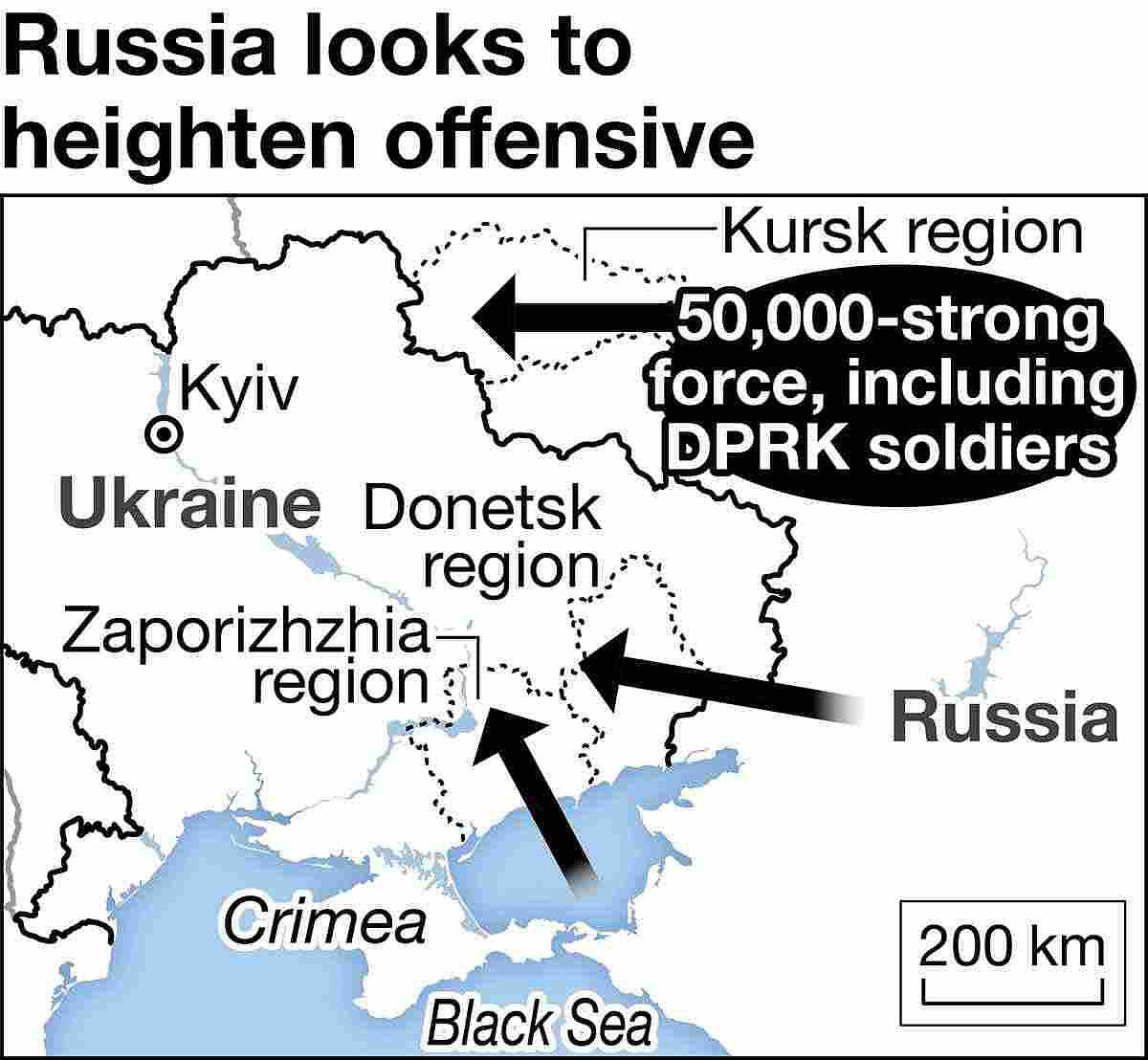 “” />
“” />
Reclaiming Kursk
Moscow finished its ratification procedures for the new treaty on Saturday with Putin’s signature, immediately after the results of the Nov. 5 U.S. presidential election were known. The Putin administration aims to expand areas under its control before Trump’s inauguration on Jan. 20, and to strengthen its position in possible negotiations for a ceasefire.
Russia particularly wants to recapture its western Kursk region, where Ukraine has been making cross-border attacks since August, because the area could be used by Ukraine as a bargaining chip. British newspaper The Daily Telegraph reported Monday that Putin has deployed troops in an attempt to recapture Kursk before Trump takes office in January.
A U.S. media outlet quoted a U.S. official as saying Russia will soon deploy a force of about 50,000, including North Korean soldiers, to Kursk to drive out the Ukrainian military.
Putin said on Nov. 7 that Russia could “conduct exercises” with North Korea based on Article 4, and he can possibly claim that North Korea’s participation in the war was for that purpose.
Reuters on Monday quoted a Ukrainian military spokesman saying the Russian infantry groups could launch ground assaults in Ukraine’s southern Zaporizhzhia region in a matter of days. This suggests that Russia is preparing to press Ukraine from multiple directions, in addition to its offensive in the eastern Donetsk region.
If it is entering the war, North Korean troops will experience their first large-scale battles since the 1950-1953 Korean War.
“If Russia uses North Korean personnel as ‘cannon fodder,’ the casualties that North Korean troops are sure to accrue will undermine whatever battlefield lessons Pyongyang hopes to learn,” the U.S. Institute for the Study of War said.
North Korea refers to the framework of the conflict between the Western countries on one side and China, Russia and North Korea on the other as a “new Cold War,” and there are fears it will seek to counter the United States with Russia and China’s support.
Top Articles in World
-

China Confirmed to Be Operating Drilling Vessel Near Japan-China Median Line
-

China Eyes Rare Earth Foothold in Malaysia to Maintain Dominance, Counter Japan, U.S.
-

Japan, Qatar Ministers Agree on Need for Stable Energy Supplies; Motegi, Qatari Prime Minister Al-Thani Affirm Commitment to Cooperation
-

North Korea Possibly Launches Ballistic Missile
-

10 Universities in Japan, South Korea, Mongolia to Establish Academic Community to Promote ICC Activities, Rule of Law
JN ACCESS RANKING
-

Univ. in Japan, Tokyo-Based Startup to Develop Satellite for Disaster Prevention Measures, Bears
-

JAL, ANA Cancel Flights During 3-day Holiday Weekend due to Blizzard
-

China Confirmed to Be Operating Drilling Vessel Near Japan-China Median Line
-

China Eyes Rare Earth Foothold in Malaysia to Maintain Dominance, Counter Japan, U.S.
-

Japan, Qatar Ministers Agree on Need for Stable Energy Supplies; Motegi, Qatari Prime Minister Al-Thani Affirm Commitment to Cooperation


